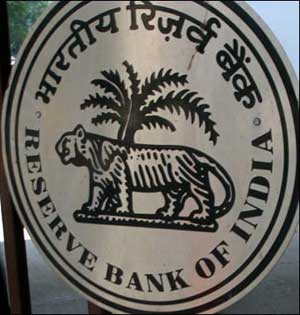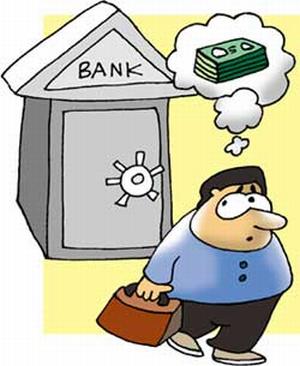Photographs: Reuters Dipta Joshi in Mumbai
You will soon be paying a higher rate of interest on your loans.
The Reserve Bank of India's annual credit policy has increased the repo rate by 50 basis points, which will mean higher cost of borrowing for banks.
And, the brass at banks such as HDFC, ICICI and State Bank of India have already made it clear that a large part of this raise will be passed on to customers.
While HDFC Bank and ICICI Bank said interest rates were bound to go up by 50-100 bps, SBI said the rise could be between 25-50 bps.
New loans are bound to get expensive. Among these, auto and home loans, the biggest components of a bank's loan portfolio, would be impacted the most.
...
Banks admit they will pass on cost to customers
Image: Fixed interest rate auto loans will remain the same.Photographs: Reuters
For existing home loan borrowers, irrespective of whether your loan is linked to the bank's base rate or its prime lending rate, you will have to bear a rise in your EMI.
So, if at a nine per cent rate of interest you were paying Rs. 900 per Rs. 1 lakh for a Rs 30-lakh loan whose tenure is 20 years, a rise of 50 bps (at 9.5 per cent) will imply paying Rs. 932 a lakh for the same loan.
Most banks, however, offer to extend the tenure rather than EMI.
...
Banks admit they will pass on cost to customers
Image: RBI has indicated a future increase of rates.In its policy, RBI has indicated a future increase of rates, too.
Typically, such sharp pointers from the central bank would lead to banks increasing their lending and deposit rates.
However, according to bankers, this time around, the impact will be more on the lending side rather than the deposit side.
According to Shyamal Saxena, general manager-retail banking products, Standard Chartered: "It would only be the odd bank that raises its rate on term deposits now, since the liquidity crunch faced by the banking sector in December and March already saw banks increasing deposit rates to attract customers.
...
Banks admit they will pass on cost to customers
Image: Banks are offering 9.5-10 per cent interest on one-year term deposits.Most banks are already offering 9.5-10 per cent interest on one-year term deposits.
According to Rajat Monga, group president, financial markets, YES Bank, if at all banks increase rates; it would be for the short-term deposits of three-six months.
"The very short-term deposits need to correspond to RBI rate movements and, so, there could be a 25-50 bps increase in these," he says.
Besides, the 50 bps increase in the savings bank account, as mandated by RBI in its annual policy, is already an increase that customers will enjoy.
...
Banks admit they will pass on cost to customers
Image: Short-term bank deposits will benefit.Deregulation of interest on savings bank accounts has been on the anvil for some time now, and the increase seems to be a step in that direction.
Like short-term bank deposits, debt funds such as liquid, liquid-plus or ultra short-term schemes that have a lower maturity are also expected to benefit from the rate rise.
Also, with RBI intent on taming the high inflation rate, managers expect further rate increase that would benefit these schemes.
...
Banks admit they will pass on cost to customers
Image: Short-term debt funds will give better returns.The short term will also provide flexibility to investors who can shift schemes, if there is a change in the interest rate cycle. Short-term debt funds will give better returns because of the constant churn that fund managers have to do.
However, the constant churn will attract short-term capital gains tax. The capital gains will be added to your income and taxed, according to the income tax slab.








article